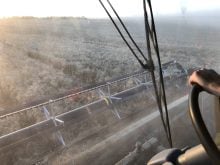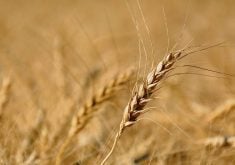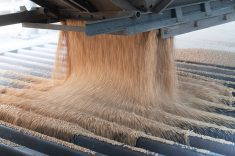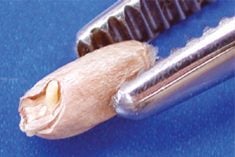For farmers it’s going to mean a single checkoff line on their grain ticket. For groups like the Canadian International Grains Institute (Cigi) and the Western Grains Research Foundation (WGRF) the changes will be more involved.
Having a direct role in funding these groups may lead to more farmer input into their governance.
- Read more: Single checkoff coming for wheat growers

Changes are coming to how Cigi is governed, Cigi CEO JoAnne Buth said. While it was too soon to comment, last week she said the direction could be clearer by the time Cigi holds its annual meeting in June.
Presumably, a new Cigi board of directors will include members from the three provincial wheat commissions given that they represent the farmers who are Cigi’s largest funders.
The current eight-person board includes chair Murdoch MacKay, the now-former assistant chief commissioner of the Canadian Grain Commission, two grain industry representatives, four farmers — one each from Manitoba, Saskatchewan, Alberta and Ontario — and Buth.
In 2015-16 wheat farmers contributed about a third of Cigi’s $10.4-million budget and the federal government contributed just slightly less, Cigi’s annual report shows. The rest came from a variety of sources including consulting, customized training and support, applied research projects, course fees and a small amount from the grain industry.
Read Also

Manitoba sunflower plant gets local owners
Scoular’s sunflower and bird feed plant in Winkler, Man., bought by Orenda Commodity Services Ltd. out of Ste. Agathe.
Farmer contributions are important because the federal government has contributed 75 cents for each $1 from farmers. However, on April 1, the government’s contribution will drop to 50 cents, to make it consistent with how it shares costs with other groups under its agro-marketing program, Buth said.
“We are looking at a variety of different options for funding going forward,” she said. “And clearly we are continuing to talk to the government as well because that is important for us.”
Asked if Cigi will seek funding from grain companies Buth replied: “It is just a little bit too early for me to talk about it.”
Arguably Cigi’s work helps Canada’s entire grain sector. But measuring and capturing that value is difficult, which raises questions about how much, if any, grain companies might contribute, underscoring the value of farmer funding.
“I really have to give credit to the growers for taking this on and having those discussions and for continuing to support us,” Buth said. “Clearly nothing talks like a cheque and to have them support us this way. It is very heartening to us that we are providing value to the industry and a big thank you to them.”
The WGRF will continue to fund wheat and other crop research, even though the money collected from the wheat and barley checkoffs will be collected and administered by the provincial wheat and barley commissions, WGRF executive director Garth Patterson said.
“The (WGRF) board just approved a four-year management plan out to 2020,” Patterson said. “We anticipate maintaining our resources to 2020. After that it will depend on the research we are funding and the partnerships that we have.
“What we are looking at for the next four years are budgets that are relatively similar (to the recent past). We will still continue to have $18 million to $19 million funding annually.”
There is a spirit of co-operation between the WGRF and the commissions, Patterson said, with the farmers’ groups in the driver’s seat.
“We are prepared to collaborate, but they will determine how they want to move forward,” he said.

















